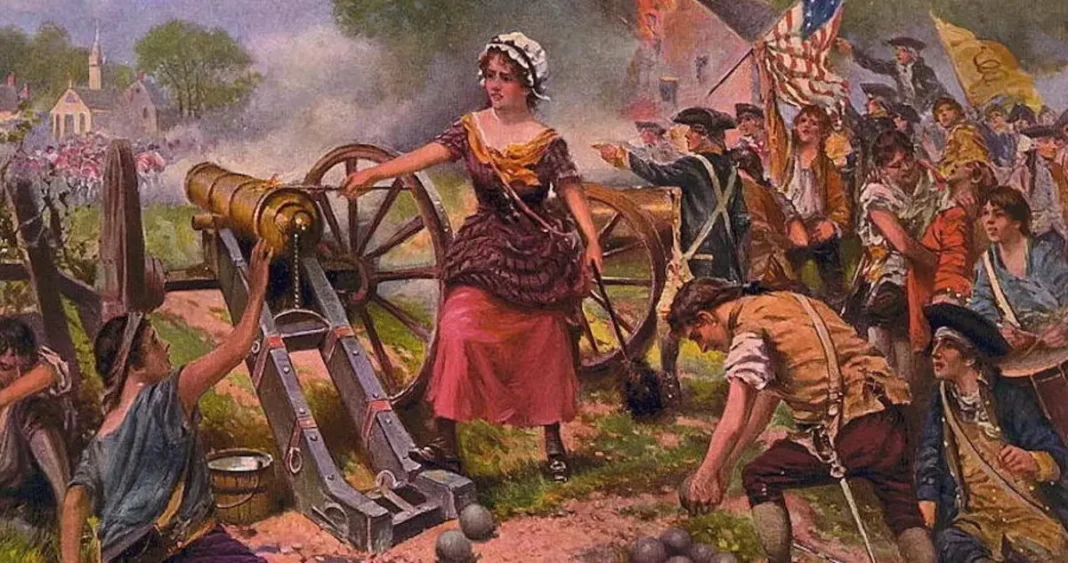In the history of cultures all throughout the world, we have myths and legends which punctuate the perception of our past. These symbolic figures and heroes help us to understand our history and put a human face to the happenings of the past. In your history classes growing up, you likely heard the story of Molly Pitcher, a nickname granted to a woman who fearlessly fought in the American Revolutionary War. But did you know that the story of Molly Pitcher was inspired by Trenton’s own Mary Ludwig Hays?
Mary Ludwig Hays was a fearless trailblazer who fought alongside the U.S. soldiers in the American Revolutionary War. Ms. Hays was born on October 13th, 1754 in the Delaware Valley area. Historians are uncertain as to whether she was born around Trenton or in Philadelphia, but records do confirm that she was brought up in a humble home. Molly was the daughter of German immigrants and hailed from modest beginnings. As was standard practice for the time, it is likely that Molly would unfortunately not have had access to an education. When Molly reached her early twenties, she was wed to William Hays, a barber. This marriage would go on to change Mary’s life in more ways than one, and before she knew it, her husband was enlisted for the Continental Army.
In Mary’s day, the standard practice was for the spouse of an enlisted service member to follow them to wherever they were stationed. While she was on-site at the army camp, Ms. Hays could often be founding lending a helping hand by cleaning and assisting in caring for the sick. In fact, it is these selfless acts that inspired the famous nickname, Molly Pitcher. “Molly” was a common nickname for women named Mary at the time, and the “Pitcher” portion of her name hails from the pitchers that ladies would often carry around while aiding with the cleaning around camp. Reflecting on their experiences with Mary, her fellow compatriots described her as a “twenty-two-year-old illiterate pregnant woman who smoked and chewed tobacco and swore as well as any of the male soldiers.”
Not content to just sit back and watch, Ms. Hays doubled down on her commitment to aiding the Continental Army and in June 1778, Mary Ludwig Hays made the brave and daring decision to enlist to serve alongside Captain Francis Proctor’s company in the Pennsylvania Artillery. Mary Hays, or “Molly Pitcher”, is best remembered for her participation in the Battle of Monmouth. During this gruesome battle, records suggest that up to 50 men perished from thirst and dehydration. Throughout the battle, Mary fearlessly ran in and out of the line of fire to run water to soldiers and provide medical relief for wounded soldiers. When her own husband was injured, however, Mary took matters into her own hands and began firing her husband’s cannon until the conclusion of the battle. Stunned by her bravery, the legend suggests that George Washington asked of the woman who took to battle, earning her the nickname “Sergeant Molly”.
Due to her bravery at the Battle of Monmouth, Mary Ludwig Hays was promoted to a non-commissioned officer. After the battle concluded, she stayed with her husband, William Hays, until the day he died. Upon his death, Mary remarried and spent the remainder of her life working as a general servant and a domestic. As a thank you for her commitment to the Continental Army, the Pennsylvania State Legislature awarded Mary a $40 a year pension for the rest of her life. Mary passed away on January 22, 1832, with her gravestone adorning a cannon and a statue of Ms. Molly Pitcher herself. As we continue to celebrate Women’s History Month, may we never forget the fierce fighters who blazed the trail for the women warriors of today.






